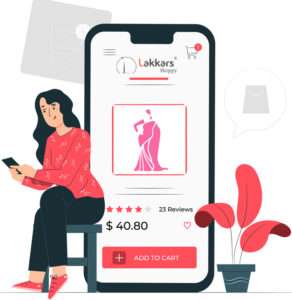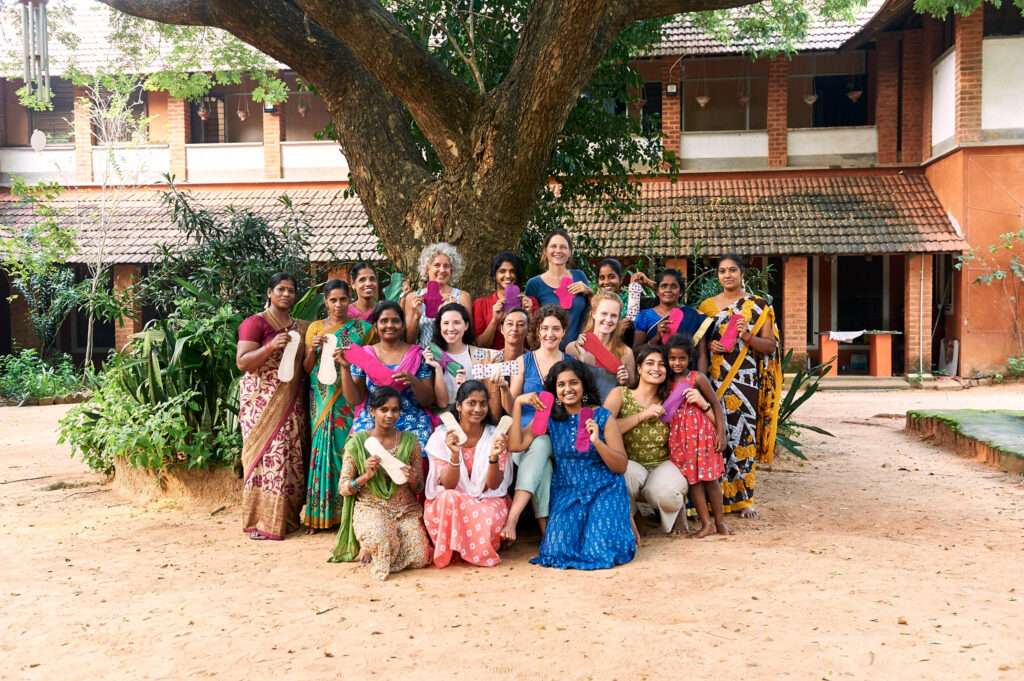
Empowerment through Eco-Femme
Eco Femme is a women-led social enterprise founded in 2010. Based in Tamil Nadu, India, their goal is to create environmental and social change through revitalising menstrual practices that are healthy, environmentally sustainable, culturally responsive, empower marginalised Indian women and connect women globally.
The founding team, comprising Kathy Walkling, Jessamijn Miedema, Anita Budhraja and Anbu Sironmani, was motivated to help the Auroville Village Action Group (AVAG), an NGO in Villipuram district Tamil Nadu, India.
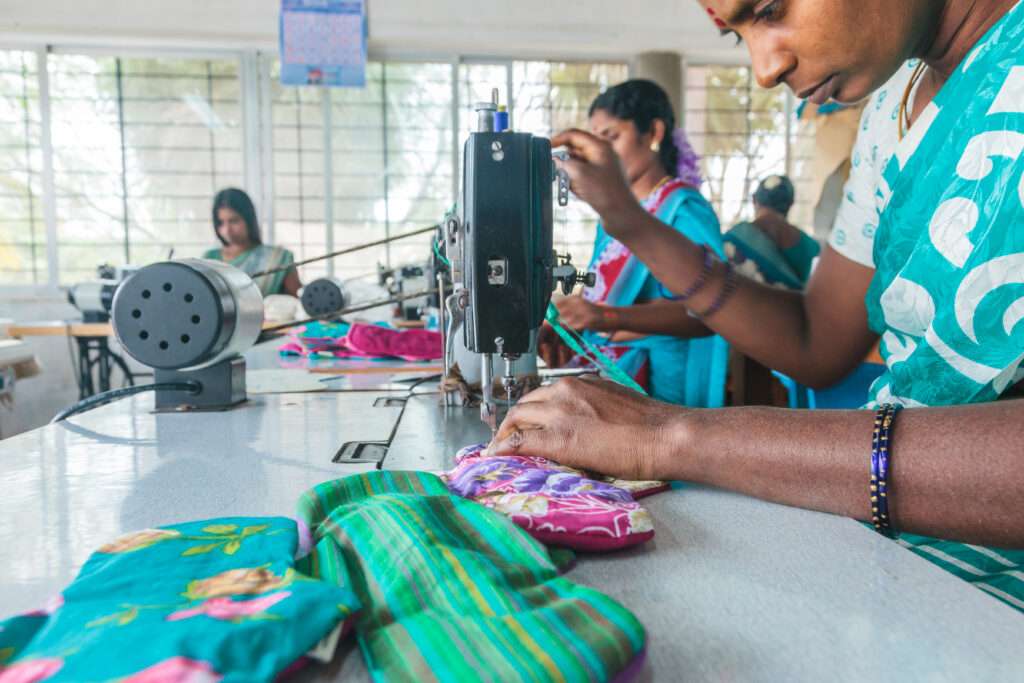
In 2009, Kathy worked with a grassroots development NGO called Auroville Village Action Group (AVAG). They were looking into possible projects that could lead to livelihood creation for rural women then she began to dream of taking this project to another level – to market cloth pads stitched by rural women. She felt confident that if they tried to sell the pads (at least overseas), it could work out on a larger scale. At this stage, Jessamijn Miedema had joined Auroville. Then they quickly discovered a common interest to work together on developing a project producing cloths washable pads and integrating more elements like livelihood creation and education on menstruation as they had discovered through reading and some field-based research, that menstruation was also a subject that women were poorly informed about and did not always handle healthily. Together they co-founded Eco Femme in its current incarnation as a social business in 2010.
The challenge was to encourage women to break free of their media-driven preference for disposable products and get them to think about eco-friendly alternatives like cloth pads—not merely in India but also in the world. The Laura O’Connell of Eco Femme discusses the business model as follows, “As the wheels turned, an operational model became clear: women tailors would stitch high-quality cloth pads and they would be sold to stores and individuals around the world at a profitable price; international sales, which would allow Eco Femme to ‘gift’ a pad to an adolescent girl through a menstrual health education programme (gifted pads would be grouped to make a kit of four). In this way, as our international sales would grow, so would our impact on the ground in Tamil Nadu, through the Pad for Pad Programme, and eventually to other states. Additionally, we would provide washable cloth pads at a subsidised rate to women who cannot afford the premium rate. These subsidised pads are available on request or when requested by NGOs working with women and girls.”
Over time, the team moved from being a donor-funded organisation to a self-sustaining one. Eco Femme hopes to find a way to simultaneously create livelihood opportunities for women members of AVAG’s SHGs and financially support AVAG’s work with rural individuals and communities. According to Eco Femme’s website, AVAG remains the umbrella organisation under which it works; AVAG also hosts it in their office and helps organise the production of washable cloth pads. AVAG help Eco Femme’s menstrual education seminars with its women’s SHGs and spread awareness about hygiene.
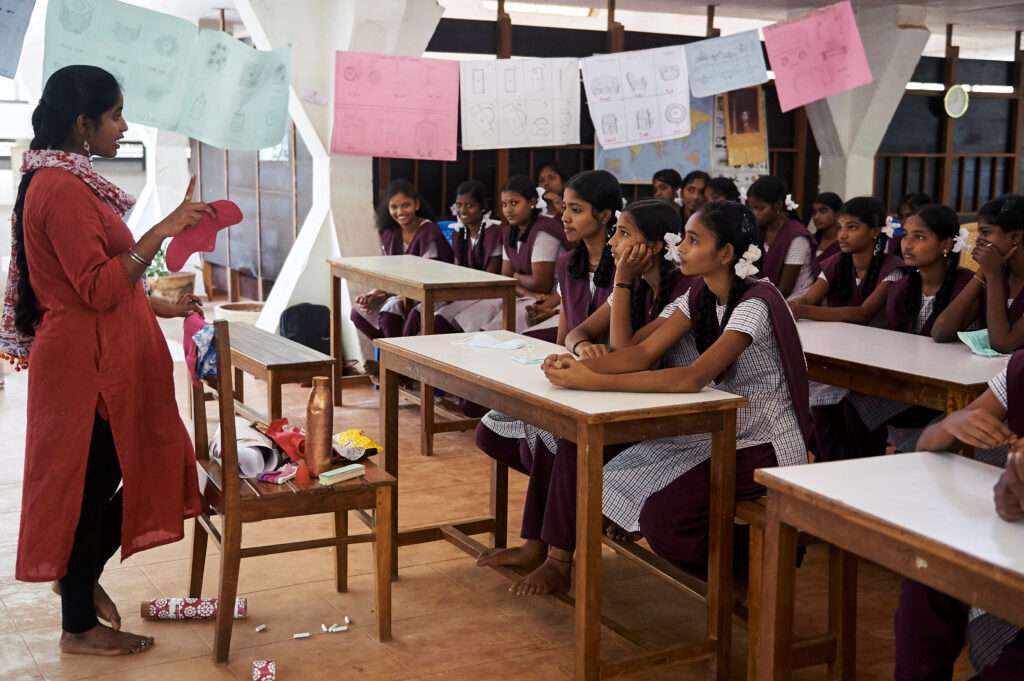
The group is not worried about obtaining ongoing funding, laura points out, “We believe that current work on menstrual hygiene in India (and around the world) has opened a potent space for reflection on the very nature of development work and what it means to be a sustainable business.” Eco Femme hopes to fill this space by being a locally inspired and guided initiative that allows women and girls to live healthily and with dignity.
In January 2014, Eco Femme entered into a relationship with Dasra, an organisation that proactively brings philanthropists and social entrepreneurs together to enhance their ability to foster change. This relationship has given it much-needed business development support.
The parting message for women readers from Eco Femme is “if well washed, sun-dried and stored in a clean place, cloth-pads are perfectly viable and healthy for MHM (menstrual hygiene management).” Those who are environment conscious should remember that disposable sanitary napkins are not eco-friendly. Eco femme makes cloth pads, which are sold in approximately 20 countries worldwide. Eco femme is a social enterprise working both ‘for profit’ and ‘not-for-profit’. Profits from international sales (those outside of India) fund their non-profit work, providing women and girls in India with access to menstrual health education and free or subsidised cloth pads through their Pad for Pad and Pads for Sisters programmes.
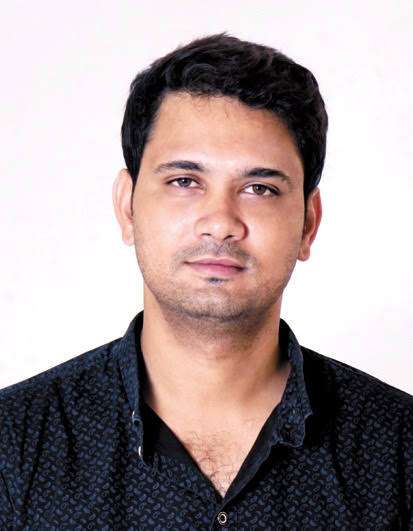
Mr Sangram has made this magazine something to be proud of what we kept expecting. He is not only an Author, for Lakkars Magazine he is the South Zone Head of India and Chief Editor of Lakkars Magazine E-Book.


